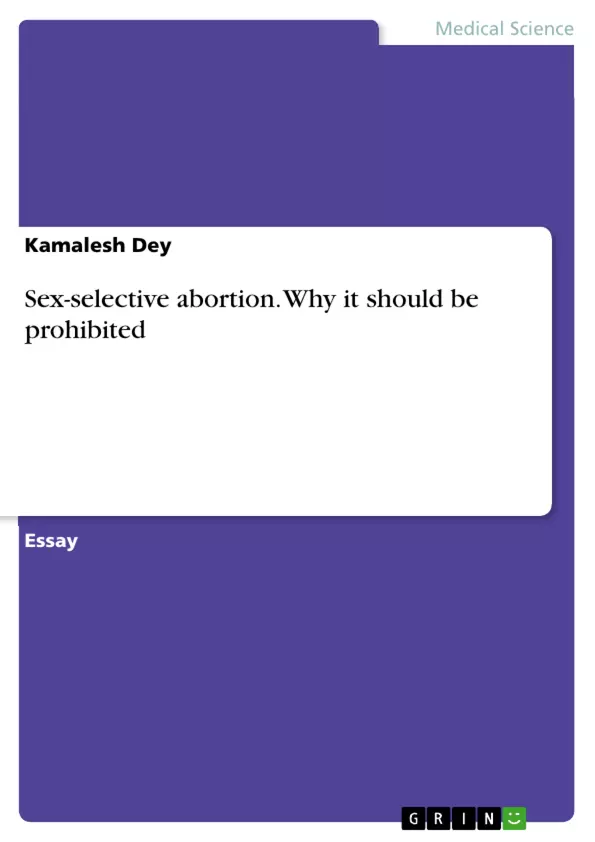The paper will talk about sex selective abortion and its negative impact on public health. The paper will also critically justify the statement “sex- selective abortion should be prohibited” through different arguments in the perspective of ethical and legal issues of health and social care.
It was said that “Abortion is defined as the emptying practice of a pregnant uterus up to the twenty four weeks of pregnancy”. However, unprompted abortion normally is called miscarriage. Abortion refers to the abolition of a fetus or embryo from the uterus just before its stage of viability. Sex selective abortion was defined as the practice of prenatal discrimination, in which a fetus is aborted just after the identification of its sex. This practice is promoting sex inequality in the society. Moreover, Sex-selective abortion is defined as the termination of a pregnancy based on the expected sex of the unborn baby. In general, female fetuses are the main victims of sex selective abortion in many countries in the world particularly in Southeast Europe, India, Pakistan and the People's Republic of China.
Inhaltsverzeichnis (Table of Contents)
- INTRODUCTION
- PREVALENCE AND PUBLIC HEALTH IMPACTS OF SEX-SELECTIVE ABORTION
- DISCUSSION
Zielsetzung und Themenschwerpunkte (Objectives and Key Themes)
This paper explores the ethical and legal implications of sex-selective abortion and argues for its prohibition. It examines the prevalence and public health impacts of this practice, particularly in countries like China and India. The paper critically analyzes arguments for and against sex-selective abortion, highlighting the ethical and legal issues surrounding it.
- The ethical and legal implications of sex-selective abortion
- The prevalence and public health impacts of sex-selective abortion
- Arguments for and against sex-selective abortion
- The role of son preference in sex-selective abortion
- The impact of sex-selective abortion on gender equality and social balance
Zusammenfassung der Kapitel (Chapter Summaries)
- INTRODUCTION: This chapter defines sex-selective abortion and discusses its prevalence and ethical implications. It highlights the practice's negative impact on public health and argues for its prohibition based on ethical and legal grounds.
- PREVALENCE AND PUBLIC HEALTH IMPACTS OF SEX-SELECTIVE ABORTION: This chapter focuses on the prevalence of sex-selective abortion in China and India, highlighting the alarming imbalance in sex ratios due to the practice. It explores the social and cultural factors contributing to this practice, such as son preference and the dowry system.
- DISCUSSION: This chapter delves into the ethical and legal arguments surrounding sex-selective abortion. It examines the perspective of medical ethics and explores the consequences of this practice for public health and society. The chapter also discusses the potential impact of prohibiting sex-selective abortion on son preference and gender equality.
Schlüsselwörter (Keywords)
Sex-selective abortion, ethical issues, legal issues, public health, son preference, gender inequality, social balance, prevalence, China, India, medical ethics, abortion.
Frequently Asked Questions
What is defined as sex-selective abortion?
It is the practice of terminating a pregnancy based on the predicted sex of the unborn baby, often following prenatal sex identification.
Which countries are most affected by this practice?
Sex-selective abortion is particularly prevalent in Southeast Europe, India, Pakistan, and the People's Republic of China.
What are the public health impacts of sex-selective abortion?
It leads to alarming imbalances in sex ratios, promotes gender inequality, and can cause long-term social instability and demographic issues.
What social factors contribute to this practice?
Key factors include a deep-seated preference for sons, cultural traditions, and economic systems like the dowry system in certain regions.
Why does the paper argue for the prohibition of this practice?
The paper justifies prohibition through the lens of medical ethics and legal issues, arguing that prenatal discrimination violates human rights and gender equality.
- Quote paper
- Kamalesh Dey (Author), 2015, Sex-selective abortion. Why it should be prohibited, Munich, GRIN Verlag, https://www.grin.com/document/333872



